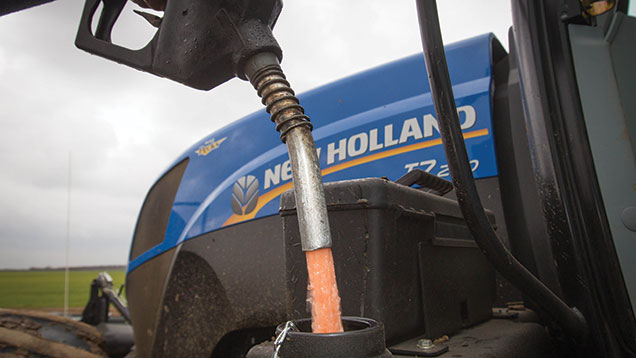Pre-harvest lull brings competitive fuel prices
 © Tim Scrivener
© Tim Scrivener Steady demand, high supplies and relatively stable world oil prices mean the fuel market is very competitive.
Sellers are chasing business in the pre-harvest lull. Traders said that while many more farmers than usual had forward-booked supplies at lower fixed prices earlier this year, they were generally expected to follow form and leave ordering harvest supplies close to the time of use.
Midweek, oil prices dipped further in expectation that a meeting of Opec ministers would decide to maintain production levels.
See also: Take advantage of low oil prices to cut arable input costs
Fuel market factors
- Keen farm-delivered prices on steady to slow demand
- Oil prices more than 40% lower than a year ago
- Fuel duty is levied at 11.14p/litre on red diesel, accounting for about 23% of the red diesel price
- Spot business is at 48-49p/litre delivered to farm next week for drops of 5,000-6,000 litres (quotes given on Wednesday, 3 June)
- Anglia Farmers’ AgInflation index showed that in the six months to February, a 19% drop in diesel prices on farm represented a 1% reduction in input costs overall
- Outlook steady but heavy demand at harvest could push up prices
- Outcome of OPEC meeting Friday (5 June) may prompt price movement
At Mole Valley Farmers’ Mole Fuel Solutions, business manager Nigel Collen expected a further slight weakening if this proved to be the decision.
While the on-farm price would generally follow the global oil price trend, a sudden rush of demand in hot weather or from an early harvest could push up local prices because of the logistical challenge of delivering a high volume in a small time-scale, said traders.
Midweek, the bulk of red diesel deliveries were going on to farm at spot rates of just under 48p-49p/litre, about 20p/litre less than it was costing a year ago.
Forward deals are available at similar prices to lock in known costs through to October.
Duncan Lambert, director and general manager of Hull-based Rix Fuels, said although it was impossible to predict fuel prices, he could not see increases for the time being.
However, it was common for prices to dip as they have done this week in anticipation of an Opec decision and to then see a small correction upwards once the decision was announced.
Demand would now slow until late July/early August, he said.
“If we are going to see an increase that will be the danger point, unless we have heightened issues in oil states across the globe.”
He has taken forward fixed bookings for 6m litres of farm fuel in deliveries of between 5,000 litres and 250,000 litres, with some farmers fixing all of their requirements, while others who were new to forward booking had gone for 50%.
The market was competitive, said Colin Revell, fuel buyer for buying group FramFarmers, but once we get into harvest, wholesalers may seek to increase their margins.
Like many farm suppliers, fuel businesses are feeling the effect of strained farm cashflows, with some offering credit terms, depending on their relationship with and the security of the customer.
